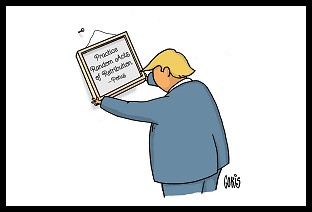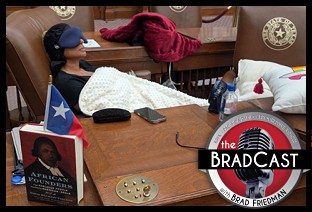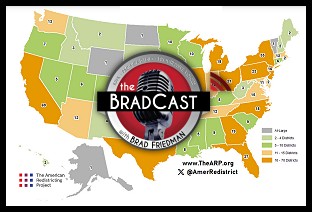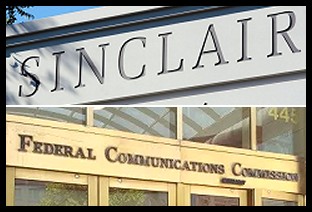-- By Brad Friedman, The BRAD BLOG
 The BRAD BLOG spoke on Wednesday, by telephone, with Ohio's Secretary of State Jennifer Brunner, for an exclusive in-depth interview following the release of her state's unprecedented "Evaluation & Validation of Election-Related Equipment, Standards & Testing" (EVEREST) review of e-voting systems.
The BRAD BLOG spoke on Wednesday, by telephone, with Ohio's Secretary of State Jennifer Brunner, for an exclusive in-depth interview following the release of her state's unprecedented "Evaluation & Validation of Election-Related Equipment, Standards & Testing" (EVEREST) review of e-voting systems.
While the bi-partisan, multi-teamed, scientific testing carried out, by a unique combination of both corporate and academic computer scientists and security experts, has won praise from most, if not all (see, predictably, here and here) quarters, the specific recommendations for changes to Ohio's voting system in its wake, as made by Brunner, have garnered a fair amount of criticism and concern from Election Integrity and Administration experts. Indeed, The BRAD BLOG has reported a number of our own concerns about those recommendations, as detailed last Friday upon the release of the report.
One thing is clear: the view from EVEREST is a mountain of "critical security failures" in Ohio's electronic voting systems --- the very same systems which will also be in use in other states and counties all across the U.S. in 2008. The question now is what can be done to mitigate the chances of yet another Ohio election meltdown next year, given the short time before before the state's primary in March, and the rapidly-approaching November general election when many eyes, no doubt, will again be on the Buckeye State.
In our interview --- the first of its kind to be published post-EVEREST --- we challenged the state's new Democratic Secretary, a former state judge, to answer to a number of growing concerns about her '08 recommendations, and whether she may be open to changing them in light of concerns. As well, we asked her about the criticism leveed against her by on-the-ground citizen Election Integrity advocates in the state, who have been critical of her for not having done enough to bring accountability following the J. Kenneth Blackwell regime, under whom Ohio's election system was so infamously gamed in 2004.
Our in-depth, exclusive interview with Ohio's new, and already embattled Secretary of State, follows in full...
Interview with Ohio Secretary of State Jennifer Brunner
Conducted December 19, 2007
By Brad Friedman for The BRAD BLOG
Transcribed by Emily LevyBRAD BLOG: First off, I know that when we spoke over the summer you had pointed out that EVEREST would be beginning on 9/11 and ending on Pearl Harbor Day…
JENNIFER BRUNNER: Well, hey, it did really begin a little bit later because we had push-back from legislators who had been contacted by some of the election officials.
BB: Right…
JB: …So the approval was actually on, I think, the 24th of September. And then we were able to proceed from there. And the actual testing began around the 7th of October and they had about two months, then, to do the testing and write their report.
BB: And I think the implication at the time when you had mentioned [9/11 and Pearl Harbor Day] was how perilous and fraught with various sorts of risks such testing could be. Just to get a real quick idea, before I get to the important stuff, were your fears materialized here? How's it going? How's the response been, in that sense?
JB: To the results of the testing?
BB: Yeah, for a start.
JB: Actually, we've received an overwhelming number of unsolicited, positive, supportive comments from everyday citizens whether it's by email or fax or letter or telephone calls, and what I was very pleased about was when we presented our results to the media on the 14th of December it was met with credibility. They asked questions, they understood it, and no one asked hostile questions like they didn't believe the results of the study.
BB: Was any of that a surprise to you?
JB: I had been concerned because I saw the reaction that Debra Bowen had in California, that she experienced, but we had the benefit in Ohio of seeing some of the things that she faced in looking at what we could do to prevent some of that. And part of what, I think, helped us was that we conducted parallel independent testing. So we not only used the academic researchers but we used corporate scientists and they did the same type of security testing in what we would call a parallel independent method. So we had additional validation.
The way that I analyzed the situation was that I looked at the spectrum of people who were interested in these issues, started from the voting activists, with the voters more in the center who've been more concerned about what their election experience and the integrity of the system, and then to Board of Elections officials and voting machine manufacturers. And understanding that, perhaps, the academic scientists would have greater credibility with the activists, while the corporate scientists might have greater credibility with the election officials and the manufacturers, and that if we compared the results of the two and they're similar and identical that actually we will gain the confidence of the public in what our results were.
BB: And [those results were] largely identical from both the academic and corporate testers?
JB: They were largely identical. The only difference is that the academic researchers were also performing source code review on all three systems. And so there was, there was an additional dimension to the report of the academics. But the interesting thing is, is that the corporate scientists, which was the company from Columbus called MicroSolve, basically looked at this as a computer-based system --- industry standards for computer security --- and the systems that we have, that have been certified here in Ohio, performed miserably.
BB: [chuckle] To put it frank…And just to give you a real quick chance to respond, I know you went out of your way to do a bipartisan report, to do, as you say, both an academic and corporate study here, and you even had the Speaker of the Ohio House join you during the press conference …
JB: Which I think spoke volumes.
BB: I think it did, too. But then there was immediately an attack from the Republican Party of Ohio's website saying that your study was put together with "left-wing activist academics" and claiming that you "cooked up" the report. So I wanted to give you a chance, if you wanted, to respond to that pretty startling criticism.
JB: Well, unfortunately, the tenor of the Republican Party on issues dealing with a Democratic state office holder such as myself, is not very objective. And they tend to find any small little thing to blow out of proportion and turn into criticism. And I'm surprised that they have any credibility within their own ranks, because if I were a member of the Republican Party and trying to read the blogs or what was on my state Party website, I would get very tired of all that negativity.
BB: When you chose the company SysTest to join this, I understand, as we had spoken before and that you felt it would be good to sort of have them as a balance to some of the academics and so forth, because SysTest has, in the past, tested for the federal labs…
JB: If I could just interject, Brad, they did not test for security. They ended up, we ended up breaking the task into about, well, four different areas: performance, general performance of the machines and the systems; configuration management, are all the machines configured to the same level according to certification in the state; security; and then internal controls and operations. So SysTest really looked at the other three areas besides security.
BB: …Which is interesting because someone had pointed me to a statement they made back in August of '06, a quote from the president of SysTest [Brian Phillips] where they said, "All of the electronic voting equipment we have tested at SysTest Labs has been found to be accurate, reliable and secure. We have not found evidence of anything that would lead us to believe that these machines," speaking about some of the ES&S machines, "are not reliable pieces of electronic voting equipment." Did their report vary from that statement, and does it concern you that they said one thing then and a different thing now?
JB: Well, I really can't speak to what the context was of what they said in 2006, but SysTest actually accommodated our ability to employ the academics to do the research. We were able to bring the academics in as subcontractors to SysTest to meet all the state purchasing requirements that we had, and SysTest actually found a number of problems in the areas that they reviewed. And some of those problems are my responsibility as Secretary of State to clear up, with policies and procedures, and some of them are ones that I inherited, such as; no kind of documentation of the configuration of these machines; is all their software at the same level?; and then with the performance issues, they found some things that were satisfactory and they found some things that were unsatisfactory.
BB: And they [SysTest] didn't have the right to change or review or edit the scientists', the academic scientists', findings, did they?
JB: Each party proceeded independently …each researcher, each contractor that worked on the study.
BB: All right, let's…
JB: With the exception, I should say, Brad, in the academics they did work as a team with the principal investigator or lead researcher being Patrick McDaniel from Penn State.
BB: Fair enough. Let me get to some of the criticisms here, because I think, by and large, serious election integrity folks and academics and computer scientists have applauded the tests, but there has been, I think it's fair to say, a big number of concerns about the recommendations.
JB: Mm-hmm…
BB: I'd like to go through the ones that concern me for a start --- with the central[ized ballot] op-scanning --- but first wanted to give you an opportunity just to respond generally, overall, to the criticism of the recommendations you made.
JB: Well, I can say that it's really good that there are so many people out there who care this much about our voting system, because it means they care about democracy. And as you would anticipate, these are going to be issues that are going to be controversial, people are going to have differences of opinion, and my attitude is to try to embrace what's out there, to look at it objectively, understanding that I don't have all the answers to everything, but I started out with what simply is what I gave the legislature: a set of recommendations. And I know, by the time all is said and done, it's not going to look the same as how I gave it to the legislature.
BB: And that's one of the questions, I understand that there may be augmentations to the recommendations, for example on audits and so forth, things that weren't specifically…
JB: …Certainly.
BB: …spoken to. But is there a chance that some of your recommendations may actually change now that some of the election integrity and election administration experts are ringing in? Because one of the criticisms was, from one of those folks that I spoke to, that your circle of advisors here may have been a bit too small, in that it was computer scientists and election officials, but didn't really include election administration experts who take into account election procedures and so forth.
JB: Well, it's likely that we'll expand our recommendations, because the environment in which we've made those recommendations is changing. For instance, the [federal] Holt bill [HR811] may actually be revived to allow states to opt in for a paper trail now. And also for a post-election audit. And the reward would be federal reimbursement for undertaking those procedures or purchasing that equipment.
BB: For a paper ballot, specifically, as opposed to a paper trail, as I understand it. But …
JB: Although there's a little question right now as to whether a state like Ohio, that already has a paper trail, would be reimbursed for a paper ballot [system]. Whereas a state like Indiana, that doesn't have a paper trail on some of its machines, whether it would be reimbursed for going to a paper trail or to a paper ballot. And we're still trying to ascertain that from Congressman Holt's office.
BB: And I have noticed that as well, so I'm glad you did also. But, nonetheless, that doesn't speak to biggest concerns. Whether there's federal funding [from the Holt bill] for paper ballots, I understand his bill will not speak to specifics like central op-scan, versus precinct-based op-scan, and that's been one of the big criticisms, you know. Larry Norden [of NYU's Brennan Center for Justice] and some of these other folks, and myself included, have said that central op-scan, particularly in Ohio (where things like Warren County's lockdown from '04 [where county elections officials locked out media and the public from the counting room on election night, based on a "terror threat" they claimed had come from the FBI, but actually hadn't, and which had simply been a plan in advance to keep folks out of the counting room in one of the last counties to report results that night] comes to mind), central counting seems far less transparent, much easier to game than precinct-based counting. And even you had said in your statement that so far the integrity of these systems, "is provided purely by the integrity of honest election officials." Shouldn't that [recommendation for centralized counting] be changed to precinct-based counting that the public can oversee? And where you've got, you know, election results posted in a decentralized fashion?
JB: Well, because of the security risks that were identified by the researchers in the study, ultimately I think that would be a very beneficial way because it's worked in the past. But until the engineering in the system is to the level that it should be to protect the systems against viruses that can be inserted into the system through something as simple as a PDA and a magnet and then the cards are passed from machine to machine almost like Typhoid Mary, I think that we have to take greater care. So then we compensate for what we lose in the precinct-based optical scan by things such as a post-election audit, by ensuring that observers can be there during the counting and also by placing precinct-based optical scanners in each polling place to allow a voter to insert their ballot, check for overvotes, be able to have that ballot back, make changes and then place it into a ballot box.
BB: And I asked [the critics from Brennan Center and elsewhere] about that yesterday. They had a conference call on some of these issues. And I shared with them, some of your responses. And they said, well, while they understand them, the risks you [refer to] are sort of understandable, if you're talking to computer scientists, but not to election administrat[ration experts], who understand how it works, and that the risks you take with central-based counting are far outweighed with precinct-based counting because if there is some of the [inappropriate] access and the viruses and so forth that you suggest, it's far more decentralized.
I did try to hold their feet to the fire on the point that you had made to me. And they said there was still no comparison in [the safety added by] doing precinct-based counting, that most of the chicanery happens when there's transport of these ballots back to the County. The chain of custody sort of disappears at that point and, as you know, many of the counties --- and the bad guys who did some pretty questionable things in '04 --- are still running things in places like Warren County and elsewhere.
Doesn't that concern you? And their criticism, we're talking about a lot of well-known election integrity and administration experts, like Larry Norden from Brennan Center, Candice Hoke from CSU and so forth. Are you hearing those complaints about your recommendations?
JB: Well, that was a really long question …
BB: Sorry.
JB: … but let me focus first on the issue of security. What I think is being missed by a lot of these academic folks, who often times focus on one particular issue in the election process, is that there is the potential to inject malicious software into a system --- and I'm talking purely computer security at this point --- but these are computer-based systems.
They operate from a server, there is firmware in machines that are in the polling places, they can be tampered with, they can be penetrated, and if there is malicious software, like a virus put into the system, it can not only affect the machines at the polling places, it can affect the tabulation that occurs at the server and it can also affect future elections if it's not detected, because we go back to the question of risk. And first of all we need to know if it's detectable, second of all if it's recoverable, if it can be recovered from. And I think that they're not grasping the severity of the risk to the system from a purely computer-based standpoint.
BB: Well, some of the folks I have talked to are, you know, computer experts, and I gotta tell you, Jennifer, that I was the one, remember, who gave the Diebold touch-screen system to Princeton for the study that revealed how easy it was to insert a virus on these systems.
And I gotta tell ya, looking at it --- and certainly as a ten-year computer programmer myself --- I'm really concerned about the transparency that gets lost when we centralize things as opposed to the decentralized counting. So I do hope you'll continue to talk with them about it, because these folks who I've talked to, I believe do understand the computer-related risks that we're talking about. But [they] understand that there needs to be, that there is mitigation [of those risks], in the more public precinct-based counting.
JB: But I still think, what our researchers found, is that with actions that look much like a person simply voting, risks that would be difficult to detect could be entered into the system. And what I've been working hard to get people to understand is that I'm not proposing a permanent solution. I'm proposing a way to deal with the limitations in the equipment that we have now. It's all that's available to us.
Then it's incumbent upon all of us, whether we're election officials or whether we're activists or computer researchers, to push the industry to improve their standards and to better engineer equipment that will meet the security standards that we are used to and that we expect in everything else that we do that involves a computer, whether it's banking or communications or driving around in our car using the GPS.
BB: Well, you understand… they did express that, you know, the recommendations you made for central-based counting might make sense for, certainly, the March primary that's coming up, but that for the longer term, for the November election, central-based counting is far more fraught with risks.
And even, by the way, you had sent me a diagram showing the risk points of where the memory cards are transferred and so forth, as I see that diagram, there's actually more risk points with the central count than with the precinct-based, if I'm understanding that chart correctly. More points of vulnerability…
[See chart at right, click it to enlarge. "M" denotes places where vulnerable memory cards are transported from point to point.]
JB: I wish I could sit beside you and point to you, with that diagram, because essentially if you were to take the report and assign the numbers of risks to each component in the system, and I think you're going to see that the greatest number of risks are with the DRE [Direct Recording Electronic voting systems, usually touch-screen], there'll be …
BB: Oh, I'll agree with that! No problem in regard to DREs…
JB: …and one of the very startling concerns that was raised for me was the ability --- with the optical scan that's predominantly used in the polling places in Ohio --- to turn off the optical scanner, turn off the memory of the optical scanner and allow the ballots to continue to be scanned but the memory is not capturing the votes.
BB: Which is, by the way, really shocking when you had mentioned that. So I agree. That said, I asked [the experts] about that as well and they said, well, that is why you need to do audits and/or use central-based counting as a double-check, if you will, on the precinct-based counting. They weren't against that, but they thought that getting the ballots counted and posted, the results posted at the precinct on election night, added an extraordinary amount of safety, transparency and decentralization to the counting.
JB: You have to take my recommendations as a whole, because we didn't say just to move to this for Election Day voting only. We said let's go to vote centers where we're voting over a 15-day period, where the ballots are being transported every day back to the Board of Elections.
We spoke with our election officials about the best way to accomplish that and the potential to use sealed boxes that would be maintained and not opened until it was time to start counting the ballots.
So, and the reason that I went the direction to take this to the legislature and to the governor, besides the issue of funding, was because people in my state and hopefully in the country will better trust a process where we've put this report out there, we allow the voting activists to come in and testify in the legislative process, we allow the election officials, the county commissioners, we allow everyone to be heard in a democratic process, and so when we have a Republican legislature, a Democratic governor and a Democratic Secretary of State we've reached a truly bipartisan solution that will increase voter confidence in what we actually decide to do. I suspect that the legislature is not going to take my recommendation wholesale and they're going to want to hear from the activists and I welcome them to join the process.
BB: So you're open to changing those recommendations as you hear from those election integrity folks?
JB: Yes. I don't pretend to have all the answers. We took this report of 800 pages and we synthesized it, we redacted trade secrets and security issues in the report and we developed recommendations with a group of 12 bipartisan election officials in a period of a week. And so we're not done.
BB: Okay, and I know we're running long so I'm trying to speed through. I've got just a couple more here for ya.
JB: Sure.
BB: You mentioned vote centers just now.
JB: Mm-hmm.
BB: You're aware of the disaster that places such as Denver have had with vote centers? When one simple technological glitch goes wrong, it means that many more thousands of folks are potentially disenfranchised, unable to even cast a vote, when you sort of put everybody into these large sort of 'mega-precinct' voting centers.
Also, there's been concerns from civil rights folks about difficulty of getting to polling places that may be farther from their homes. But I'm more concerned about what happens if one thing goes wrong at a voting center, on purpose or by accident, the number of additional folks who may be disenfranchised, the way we saw last year in Denver when thousands couldn't cast their vote after a problem with the computerized registration system.
JB: Well, we set up this model with the understanding that Ohio's voter registration closes 30 days before the election. By starting the early voting at the vote centers before the election, we are giving the Boards of Elections a good two weeks to make sure their registration records are cleaned up, in good shape.
And in fact, in Ohio, we're doing a pilot project that's funded by the Pew Charitable Trust, where we're actually trying to work to spread out registration over the period, in every moving packet that the post office sends out to someone who files a change of address, and that will occur in 45 counties. But either way, we'll deal with the glut at the end of the registration period. That'll give the Boards two weeks to get their poll lists together. And then, with the recommendations, it's not dependent upon a machine for someone to be able to vote. Unless they have a disability and they would be using an AutoMARK machine [a ballot marking device for the blind and disabled].
BB: Were you talking about voting centers for early voting only or also for Election Day voting?
JB: For early voting and for Election Day voting. And, again, the five to ten precincts [which would be combined in her recommendations] is a flexible number. It's going to need to be based upon what the legislature thinks, what the legislature is willing to fun. Because we think ten precincts over a 15-day period may be a little too big.
BB: Do you not have fears, even if you don't have, for example, computerized registration, there's going to be folks who are challenging voters at the polling place on Election Day --- If that's done at a vote center or folks are using DREs or even precinct-based op-scan, since you haven't banned either of them per se, other than recommending against them, if they're using those at vote centers …
JB: They're not going to be using those at vote centers.
BB: They're not?
JB: No. The only [thing they will use] is a pencil or a pen to mark an optical scan ballot, or an AutoMARK if they have a disability. Because we looked at this and we did not want it to be set up like a Bureau of Motor Vehicles where the computer goes down and everybody has to wait in line an inordinate amount of time.
BB: So if [the legislature] decided to allow vote centers, but they allowed for the continuing use of DREs and/or precinct-based op-scan, you'd be against that plan in general?
JB: It would be very unlikely that they would go along with that. I think, for the legislature, our Republican legislature, it's going to be a challenge for them to go along with the concept of a vote center, and some are going to have difficulty going along with the concept of that many days of early voting at locations other than the Board of Elections. But that's our job to educate.
UPDATE: After publishing this interview, the Secretary of State's office sent us this chart [PDF] to help clarify their proposed new timeline for registration, early voting, counting etc.
BB: Why didn't you just decertify some of these systems given some of the absolutely startling findings in your report? Statutorily, you have the right to do so. Why did you not do so?
JB: I would have to work through the Board of Voting Machine Examiners, which I have appointed the members. But looking at where we are, so close to the March primary, it would have created chaos.
BB: You could have decertified, you know, by the November general election…or even after that election, for that matter.
JB: I think that in this instance when my biggest goal, in my first year in office, is to restore and ensure voter confidence in Ohio, looking at the partisan climate that seems to exist in Congress, that seems to exist in some of the folks in the Ohio GOP, the last thing I wanted to do was to set this up as a partisan debate. Because there is not a Republican or a Democratic way to run a fair election. What's fair is fair.
BB: Well, that's true, but what's partisan about saying, "Hey, I did this bipartisan study. These folks said you can wave a magnet in front of a computer and completely wipe out the voting data. Therefore these systems should never be used and I'm decertifying them"? What's partisan about that?
JB: If I want to go from my past experience, when I asked both Republicans and Democrats on the Cuyahoga County Board of Elections to resign, the accusations that came from the chairman of the Ohio GOP, who was one of the members, was that I was being partisan and trying to take control of the election.
BB: Well, that's Bob Bennett, and we know he's gonna do that, and it was still done anyway, as you saw from that attack on the Ohio Republican Party website. So they still made that attack…
JB: But the attack's minor. The attack is minor.
BB: Okay. You think it would have been more so had you just, had you actually decertified these systems?
JB: And this is isn't, and what I wanted to ensure is that it is not about me. It is about the voters of Ohio. And I want to keep people focused on that. And if things work best, we get the support of the public the best when we have a very bipartisan approach to it in Ohio. We saw it in the adoption of the state budget for the first time in over 50 years, it unanimously passed the Senate, or had one dissenting vote, I believe, in the House. It was unbelievable and it's done a lot to buoy the confidence of Ohioans in their government in a time when much reform is needed.
BB: How can, you mentioned the public, how can they best help you in your goals here? Is there anything that they can do to help make noise to support election integrity here?
JB: They should continue to make their voices heard. If they like the plan, or they like parts of the plan that we've made recommendations for, they should let the Ohio legislature know.
BB: I've got some concerns about the vote-by-mail recommendation you made, but I know we're running late and I do want to get in one question here, hopefully on the record. There were, as you know, some of the election integrity advocates in Ohio have been critical because you have not brought accountability to a lot of the allegations and concerns, and indeed evidence of problems in the '04 election including 56 out of 88 counties who did not retain their ballots as they were supposed to by order of a federal judge.
Don't you think, or do you think, I should say, that not bringing accountability there for what happened in '04 sends the wrong message in '08 --- since I know you're keeping your eyes on '08 --- but doesn't 'letting the bad guys get away with it', as it were, doesn't that send the wrong message for '08?
JB: Well, a couple points. I was a judge before I was Secretary of State. And I understand that, in order to prove a credible case it's with evidence that's beyond a reasonable doubt. The evidence has to rise to a certain level to get you probable cause, which would lead to an indictment. So that's one issue….
BB: But not for recommendation to …
JB: Let me…
BB: Okay.
JB: … finish through the rest of this.
When I came into office there were 21 lawsuits against Mr. Blackwell [Ohio's former Sec. of State, a Repulican and state co-chair of the Bush/Cheney '04 committee]. I inherited all of them. I have five elections attorneys plus a general counsel and two attorneys who handle legislation. We brought in an additional attorney just to manage the litigation and, to be very frank with you, I inherited some real problems from the former administration. And the last thing I want for my state, is to be looked at as a pariah like it was for 2004.
And while, yes, there are problems like ballots not being retained [for the 2004 election], when I look back at the records to see what kind of instructions the Boards received from Mr. Blackwell, it was a very, very sparse email from a paralegal saying 'the chief counsel wants you to see this', with no explanation. Uh…I have to focus on the future.
BB: Well, not to pick on Warren County again, but they locked people out of the counting room. They claimed that there was a Homeland Security warning from the FBI. Nobody at the FBI has ever said such a thing. They were clearly lying and, as I understand, those [same] people are still running elections in Warren County. Doesn't that trouble you? And particularly as you're doing, recommending, central counting, these guys are going to be in charge of the counting yet again in '08, and they've been told, you know, hey, you got away with it in '04.
JB: We will look at the situation, because when I came into office people were where they were. And we'll look again at that situation and see what the best course of action is to prevent it from happening in the future.
BB: I hope you will, because that one is just…
JB: It's troubling me too.
BB: …just mind-blowing.
JB: It troubles me, Brad.
BB: It troubles you, too?
JB: It troubled me at the time and it, it, I can't…I can't find any justification for it.
BB: Me neither, so I hope you'll do something about it, if only to send a message to --- because it's not the only place it happened --- but if only to send a message to folks that this will not be tolerated in 2008. And I think taking some action there may do that. All right …
JB: One thing, if I could just add …
BB: Sure.
JB: What we try to do, and some of these things are imperceptible, but we've worked every single day, we've been in the administration to improve the instructions, to improve the clarity and to improve the guidance that we provide to the Boards of Election. They now have access to election attorneys that are specifically assigned to their county. They now have regional liaisons, over half of whom have prior Board of Elections experience, and we think that when this all comes together for 2008, that the country will see a difference.
BB: I hope you're right, but I'm still concerned about the bad guys in places like Warren. But I hear you and I appreciate that.
I know we've already run over the allotted time and I really appreciate that…so thank you.
JB: Thank you so much, Brad. I appreciate the opportunity to be heard and I, I mean honestly, the more dialogue we have the better off we are.
BB: I concur, and thank you again.
JB: Thanks so much, Brad.


 Sunday 'Random Acts of' Toons
Sunday 'Random Acts of' Toons From CA's 'Nuclear Deterrence' Map to Newsom's Trolling to Trump's 'Fascist Theatre' and Beyond: 'BradCast' 8/21/25
From CA's 'Nuclear Deterrence' Map to Newsom's Trolling to Trump's 'Fascist Theatre' and Beyond: 'BradCast' 8/21/25 'Green News Report' 8/21/25
'Green News Report' 8/21/25
 On 'Americanism' and Trump's 'Stalinesque' Plot to Whitewash U.S. History: 'BradCast' 8/20/25
On 'Americanism' and Trump's 'Stalinesque' Plot to Whitewash U.S. History: 'BradCast' 8/20/25  Texas GOP Imprisons Dem State Lawmaker in State House Chamber: 'BradCast' 8/19/25
Texas GOP Imprisons Dem State Lawmaker in State House Chamber: 'BradCast' 8/19/25 'Green News Report' 8/19/25
'Green News Report' 8/19/25 Trump, Nazis and
Trump, Nazis and  Sunday '
Sunday ' Newsom's 'Election Rigging Response Act'; FCC's License Renewal for Sock-Puppeting Sinclair: 'BradCast' 8/14/25
Newsom's 'Election Rigging Response Act'; FCC's License Renewal for Sock-Puppeting Sinclair: 'BradCast' 8/14/25 'Green News Report' 8/14/25
'Green News Report' 8/14/25 140 New House Reps?: Moving Beyond the Gerrymandering Wars: 'BradCast' 8/13/25
140 New House Reps?: Moving Beyond the Gerrymandering Wars: 'BradCast' 8/13/25 FCC Renews Sinclair TV Licenses Despite Complaint from Petitioner Who Died Waiting
FCC Renews Sinclair TV Licenses Despite Complaint from Petitioner Who Died Waiting It's Not About the Rule of Law, It's About Authoritarian Control: 'BradCast' 8/12/25
It's Not About the Rule of Law, It's About Authoritarian Control: 'BradCast' 8/12/25 'Green News Report' 8/12/25
'Green News Report' 8/12/25 After Vaccine Cancels, CDC Shooting, Former Officials Want RFK Out: 'BradCast' 8/11/25
After Vaccine Cancels, CDC Shooting, Former Officials Want RFK Out: 'BradCast' 8/11/25 Sunday 'All's Well' Toons
Sunday 'All's Well' Toons 'Green News Report' 8/7/25
'Green News Report' 8/7/25 Trump Wars Against Greem Energy, Democracy on VRA's 60th: 'BradCast' 8/7
Trump Wars Against Greem Energy, Democracy on VRA's 60th: 'BradCast' 8/7 Media Conglomerates Continue Trump Capitulation: 'BradCast' 8/6/25
Media Conglomerates Continue Trump Capitulation: 'BradCast' 8/6/25 Banana Republican: Trump Shoots the Labor Statistics Messenger: 'BradCast' 8/5/25
Banana Republican: Trump Shoots the Labor Statistics Messenger: 'BradCast' 8/5/25 All's Fair in Love, War and, Apparently, Part-isan Gerrymandering: 'BradCast' 8/4/25
All's Fair in Love, War and, Apparently, Part-isan Gerrymandering: 'BradCast' 8/4/25 The Art of the Corrupt, Phony, Unlawful, Pretend Trade Deal: 'BradCast' 7/31/25
The Art of the Corrupt, Phony, Unlawful, Pretend Trade Deal: 'BradCast' 7/31/25 Battle Begins Against Trump EPA Climate Regulations 'Kill Shot': 'BradCast' 7/30/25
Battle Begins Against Trump EPA Climate Regulations 'Kill Shot': 'BradCast' 7/30/25 A Pu Pu Platter of Trump Corruption: 'BradCast' 7/29/25
A Pu Pu Platter of Trump Corruption: 'BradCast' 7/29/25 'Catastrophic' GOP Cuts to Medicaid, Medicare, ACA: 'BradCast' 7/28/25
'Catastrophic' GOP Cuts to Medicaid, Medicare, ACA: 'BradCast' 7/28/25
 VA GOP VOTER REG FRAUDSTER OFF HOOK
VA GOP VOTER REG FRAUDSTER OFF HOOK Criminal GOP Voter Registration Fraud Probe Expanding in VA
Criminal GOP Voter Registration Fraud Probe Expanding in VA DOJ PROBE SOUGHT AFTER VA ARREST
DOJ PROBE SOUGHT AFTER VA ARREST Arrest in VA: GOP Voter Reg Scandal Widens
Arrest in VA: GOP Voter Reg Scandal Widens ALL TOGETHER: ROVE, SPROUL, KOCHS, RNC
ALL TOGETHER: ROVE, SPROUL, KOCHS, RNC LATimes: RNC's 'Fired' Sproul Working for Repubs in 'as Many as 30 States'
LATimes: RNC's 'Fired' Sproul Working for Repubs in 'as Many as 30 States' 'Fired' Sproul Group 'Cloned', Still Working for Republicans in At Least 10 States
'Fired' Sproul Group 'Cloned', Still Working for Republicans in At Least 10 States FINALLY: FOX ON GOP REG FRAUD SCANDAL
FINALLY: FOX ON GOP REG FRAUD SCANDAL COLORADO FOLLOWS FLORIDA WITH GOP CRIMINAL INVESTIGATION
COLORADO FOLLOWS FLORIDA WITH GOP CRIMINAL INVESTIGATION CRIMINAL PROBE LAUNCHED INTO GOP VOTER REGISTRATION FRAUD SCANDAL IN FL
CRIMINAL PROBE LAUNCHED INTO GOP VOTER REGISTRATION FRAUD SCANDAL IN FL Brad Breaks PA Photo ID & GOP Registration Fraud Scandal News on Hartmann TV
Brad Breaks PA Photo ID & GOP Registration Fraud Scandal News on Hartmann TV  CAUGHT ON TAPE: COORDINATED NATIONWIDE GOP VOTER REG SCAM
CAUGHT ON TAPE: COORDINATED NATIONWIDE GOP VOTER REG SCAM CRIMINAL ELECTION FRAUD COMPLAINT FILED AGAINST GOP 'FRAUD' FIRM
CRIMINAL ELECTION FRAUD COMPLAINT FILED AGAINST GOP 'FRAUD' FIRM RICK SCOTT GETS ROLLED IN GOP REGISTRATION FRAUD SCANDAL
RICK SCOTT GETS ROLLED IN GOP REGISTRATION FRAUD SCANDAL VIDEO: Brad Breaks GOP Reg Fraud Scandal on Hartmann TV
VIDEO: Brad Breaks GOP Reg Fraud Scandal on Hartmann TV RNC FIRES NATIONAL VOTER REGISTRATION FIRM FOR FRAUD
RNC FIRES NATIONAL VOTER REGISTRATION FIRM FOR FRAUD EXCLUSIVE: Intvw w/ FL Official Who First Discovered GOP Reg Fraud
EXCLUSIVE: Intvw w/ FL Official Who First Discovered GOP Reg Fraud GOP REGISTRATION FRAUD FOUND IN FL
GOP REGISTRATION FRAUD FOUND IN FL

































